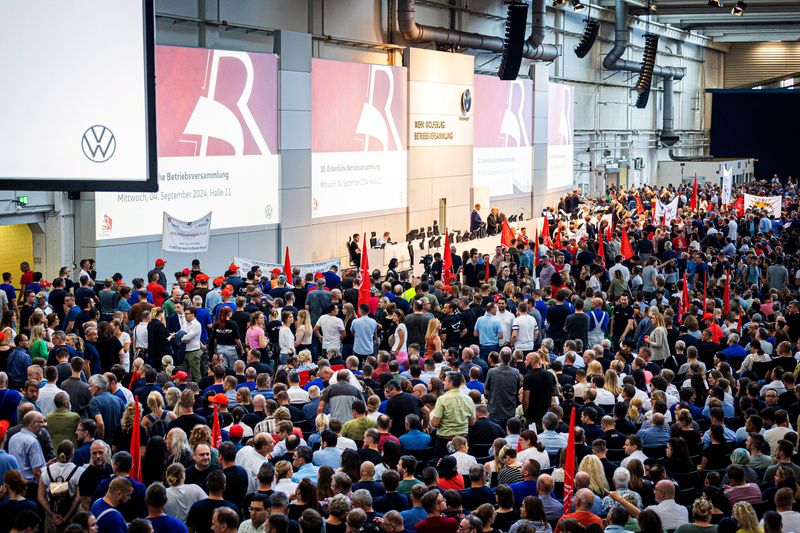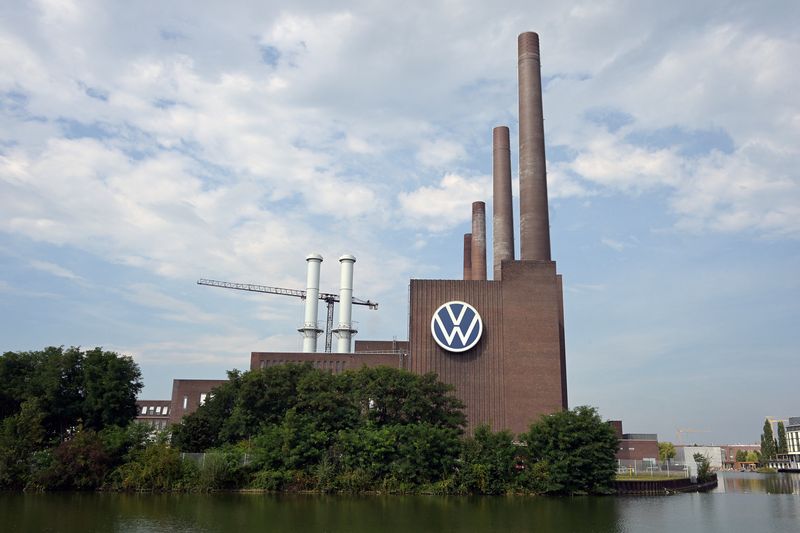By Victoria Waldersee and Christina Amann
WOLFSBURG, Germany (Reuters) -Volkswagen has "one, maybe two" years to turn its main car brand around, its finance chief said on Wednesday, as the auto giant weighs its first ever plant closures in Germany and its powerful unions threaten a fight.
Heckled with shouts of "Auf Wiedersehen" - German for 'goodbye' - Arno Antlitz told a gathering of 25,000 workers that they needed to work with management in cutting spending to help the brand survive the shift to electric cars.
He told the meeting at Volkswagen (ETR:VOWG_p)'s Wolfsburg headquarters that Europe's car market had shrunk after the pandemic and the company was facing a shortfall in demand of about 500,000 cars, equivalent to about two plants.
"The market is just not there," he said according to excerpts of his speech, adding he did not expect sales to recover and the core VW brand had "one, maybe two" years to cut spending and adjust output.
"There are no more cheques coming from China," added CEO Oliver Blume, referring to falling profits in Volkswagen's biggest market, according to a person at the meeting.
The stark warning reflects mounting challenges for Europe's car giants, including Stellantis (NYSE:STLA) and Renault (EPA:RENA), amid high labour and energy costs as well as rising competition from lower-cost Asian rivals shipping more cars to the region.
Works council chief Daniela Cavallo said Volkswagen's management had "massively damaged trust". Union IG Metall did not rule out strikes and saw no reason to reduce wage demands in upcoming negotiations.
"Management has broken a taboo in a major way, and workers are prepared to be there when we call on them," said Cavallo, vowing to prevent plant closures.
She urged Blume to explain why the group was prioritising spending on a 5-billion-euro software partnership with U.S. startup Rivian (NASDAQ:RIVN) over protecting German jobs.
The prospect of site closures at one of Germany's most storied companies has raised more red flags for Europe's largest economy, which is battling weak export demand and high costs.
Fresh from a drubbing in regional elections, Chancellor Olaf Scholz has spoken with Volkswagen's management and works council and "is clear on the significance" of the company, a spokesperson said.
Labour Minister Hubertus Heil promised support, telling RTL/ntv that "Germany must remain a strong car country". He gave no details but Scholz's cabinet agreed tax cuts to boost demand for EVs, which has lagged expectations. His Social Democrats may also lobby the government for support on energy prices.
Late last year, the three-way coalition prematurely ended a subsidy scheme to boost demand for EVs. IG Metall on Wednesday called for more stimulus measures from Berlin.
Underscoring the tough backdrop, business sentiment in the German automotive industry slid further into negative territory in August, the Ifo economic institute said.
Sweden's Volvo (OTC:VLVLY) Cars also scrapped its target of going all electric by 2030.
Volkswagen, whose brands also include Audi, SEAT and Skoda, said on Monday it was considering closing factories in Germany and ending job guarantees at six of its plants in a drive to deepen a 10 billion euro ($11 billion) cost-cutting plan.
It is targeting a 6.5% profit margin at the VW brand by 2026, up from 2.3% in the first half of this year. The brand accounted for the majority of group car production last year.
"People are scared of losing their houses and being fired. I have been at the plant for 38 years," worker Axel Wenzlaff told Reuters outside the Wolfsburg factory.
Blume's decision to challenge the unions is a departure from his image as a team player who keeps labour on side.
Some investors and analysts speculated the spectre of plant closures could be a negotiating tactic to get rid of job guarantees and drive down wage demands. About 120,000 of the VW brand's 200,000-strong workforce is in Germany.
"He definitely won't manage to get rid of job guarantees, cancel wage increases and close plants. But we can't rule out that he will manage one or two of those goals," said Moritz Kronenberger, portfolio manager at Volkswagen shareholder Union Investment.
Still, union representative Thomas Knabel said there would be no talks unless Volkswagen took plant closures off the table.
While management blamed financial pressures on a worsening German economy and new competitors, unions said the carmaker's production strategy was inefficient and decision-makers had been too slow in investing to produce a mass-market electric vehicle.
Whatever the cause, analysts said quick decisions were needed - a challenge for a firm of Volkswagen's size with a complex power structure formed over its 87-year history.

The company is also still dogged by past problems. This week former CEO Martin Winterkorn appeared in court over the so-called dieselgate scandal, nine years after Volkswagen admitted to rigging U.S. emissions tests.
($1 = 0.9058 euros)
